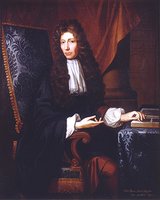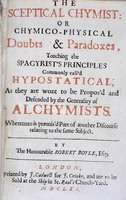Robert Boyle

Boyle, Robert
Robert Boyle (1627–1691) was born at Lismore Castle, Munster, Ireland, the 14th child of the Earl of Cork. As a young man of means, he was tutored at home and on the Continent. He spent the later years of the English Civil Wars at Oxford, reading and experimenting with his assistants and colleagues. This group was committed to the New Philosophy, which valued observation and experiment at least as much as logical thinking in formulating accurate scientific understanding. At the time of the restoration of the British monarchy in 1660, Boyle played a key role in founding the Royal Society to nurture this new view of science.

Although Boyle's chief scientific interest was chemistry, his first published scientific work, New Experiments Physico-Mechanicall, Touching the Spring of the Air and Its Effects (1660), concerned the physical nature of air, as displayed in a brilliant series of experiments in which he used an air pump to create a vacuum. The second edition of this work, published in 1662, delineated the quantitative relationship that Boyle derived from experimental values, later known as "Boyle's law": that the volume of a gas varies inversely with pressure.
Boyle was an advocate of corpuscularism, a form of atomism that was slowly displacing Aristotelian and Paracelsian views of the world. Instead of defining physical reality and analyzing change in terms of Aristotelian substance and form and the classical four elements of earth, air, fire, and water—or the three Paracelsian elements of salt, sulfur, and mercury—corpuscularism discussed reality and change in terms of particles and their motion. Boyle believed that chemical experiments could demonstrate the truth of the corpuscularian philosophy. In this context he defined the term element in Sceptical Chymist (1661) as " . . . certain primitive and simple, or perfectly unmingled bodies; which not being made of any other bodies, or of one another, are the ingredients of which all those called perfectly mixt bodies are immediately compounded, and into which they are ultimately resolved."
He was probably referring to the uniform corpuscles—which were as yet unobserved—out of which corpuscular aggregates were formed, not using "elements" as Antoine-Laurent Lavoisier and others used the term in the 18th century to refer to different substances that could not be broken down further by chemical methods. In his experiments Boyle made many important observations, including that of the weight gain by metals when they are heated to become calxes. He interpreted this phenomenon as caused by fiery particles that were able to pass through the walls of glass vessels.
Boyle also wrote extensively on natural theology, advocating the notion that God created the universe according to definite laws.
Further Reading
- American Chemical Society
- Chemical Heritage Foundation
- Robert Boyle: An Introduction, Robert Boyle Project, Birkbeck College, University of London
- Society of Chemical Industry
- The Chemists' Club
- The Life and Thought of Robert Boyle, Robert Boyle Project, Birkbeck College, University of London